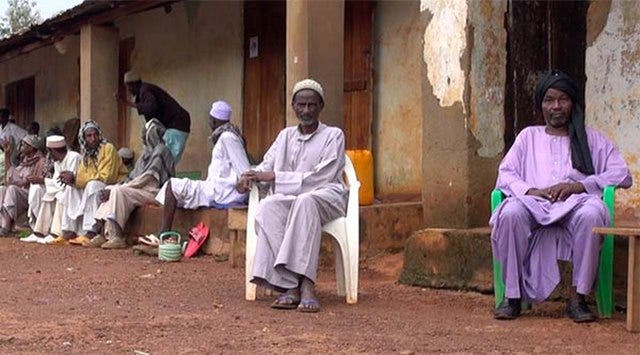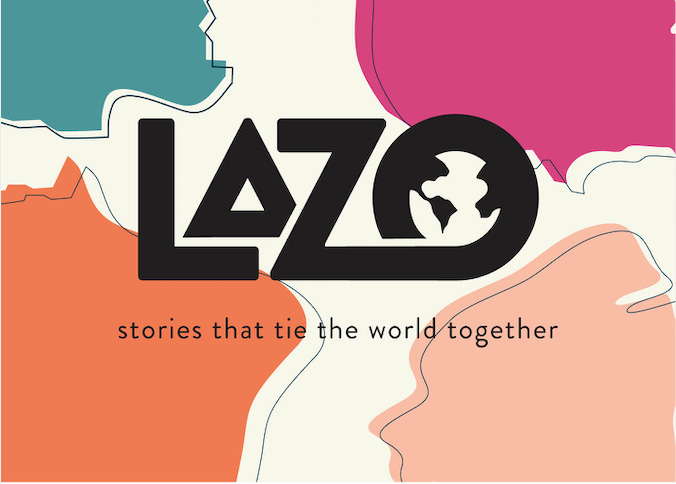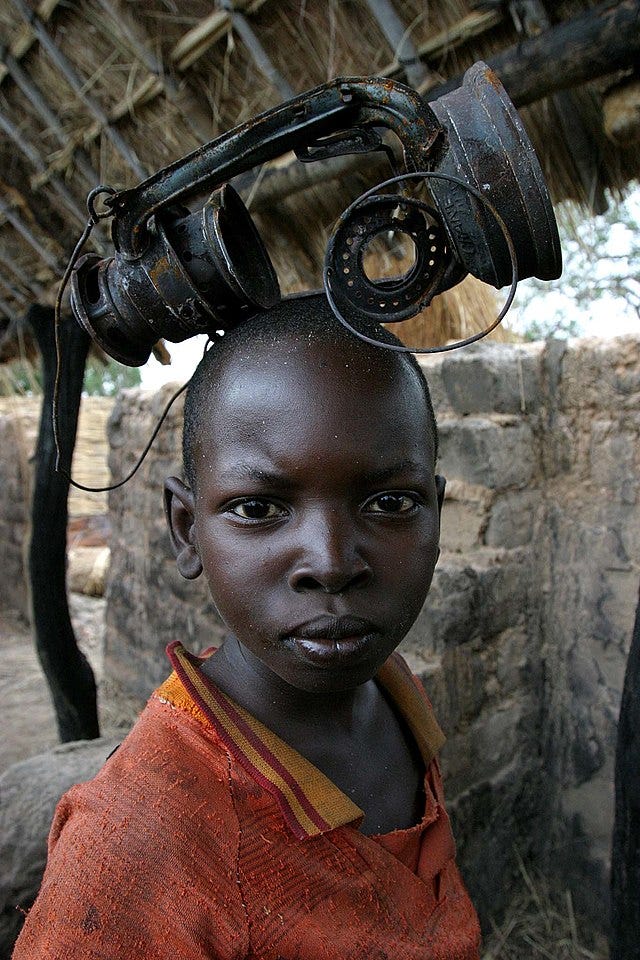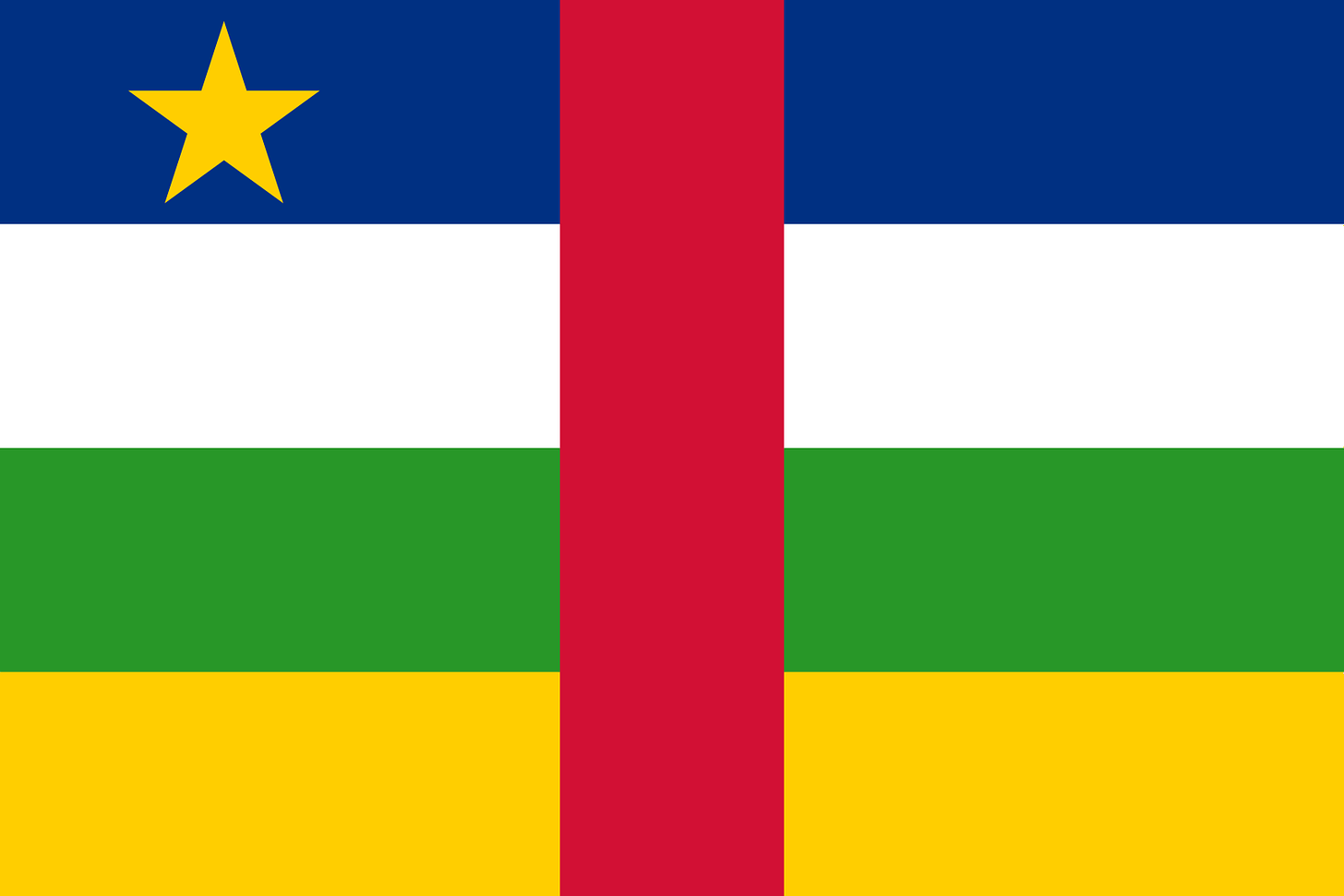It’s the last week before Congress is back in session in Washington, which, in my life, means that summer is officially over, even if we haven’t quite reached the Autumn equinox. I’ll be on a NYC beach this weekend, soaking up the last rays of sun before I return to the capital to spend hours indoors.
Because National Journal took the week off from publishing, you’ll have to wait to read my deep dive on the future of Russia’s mercenary Wagner Group after the death of its leader, Yevgheniy Prigozhin. In the meantime, I included many other people’s stories on the subject in the What I’m Reading section. The Wagner Group is also highly relevant to the country highlighted this week.
An image of a young boy playing with a burnt lamp in Birao, Central African Republic. According to Wikimedia, “the town was almost completely burnt down in March 2007 during fighting between rebels and government troops in the Central African Republic Bush War.” This photo was taken in 2008. I wonder where that young boy is today.
This week is about the Central African Republic.
Welcome to the 195 series, where I take you on a mini-tour of every country (and maybe some places that want to be countries). Each week I'll feature a new location. Some you may have heard of, while others may be new to you. The point is to learn and nurture our curiosity about the wider world. Maybe you'll find a new artist you like, too. You can skip to the bottom if you only want the week's news.
Country Info:
Population: Roughly 5.45 million.
Current government: The history of the Central African Republic is marred by conflicts, coups, and general instability. The country gained independence from France in 1960 and has experienced six coups in the years since. That’s roughly a coup per decade.
Former President François Bozizé came to power when he staged a coup in 2003, and much of CAR, especially the northern regions, has been in the hands of rebel groups ever since. Government power exists mainly in the capital, Bangui.
According to the organization Freedom House,
The Central African Republic (CAR) suffers from pervasive insecurity and an absence of state authority in much of the country. A series of peace deals between the government and various armed groups have not produced improvements in the security situation and have been repeatedly breached by both parties. Violent attacks against civilians, including sexual violence, are an acute risk in many areas.
CAR has been engaged in a full-fledged civil war since 2012, as fighting between the predominantly Christian anti-Balaka militia (which means “invincible” in the Sango language) and the mainly Muslim Séléka rebel coalition led to thousands of deaths.
In 2013, armed groups seized the capital and forced President Bozizé to flee.
After that, according to the Council on Foreign Relations:
The United Nations Security Council established a peacekeeping force in April 2014 that incorporated African Union and French forces that had previously deployed to CAR. MINUSCA was established with a mandate to protect civilians and disarm militia groups, and it currently has more than eighteen thousand peacekeepers operating in CAR. MINUSCA faces significant challenges in fulfilling its mandate to protect civilians and dismantle armed groups.
The current President, Faustin-Archange Touadéra, largely owes his power to Russia’s Wagner Group mercenaries, who protect his regime from armed uprisings while committing human rights violations.
The Brookings Institution described Wagner’s presence in CAR like this:
In the Central African Republic (CAR), the Wagner Group has been propping up the weak government of President Faustin-Archange Touadéra, whose writ extends little beyond the capital, against various rebel groups since 2018. Its arrival in CAR coincided with a Prigozhin-linked company being awarded diamond and gold mining licenses. The Russian security company has been widely accused of perpetrating severe human rights violations and harassing peacekeepers, journalists, aid workers, and minorities.
In early August, the country held a referendum on whether to scrap limits on the number of times the president can run for office. It also extended the presidential term from 2 to 7 years. Touadéra plans to stay in power for as long as possible.
Election authorities said that 95 percent of participants approved of the changes. But Wagner mercenaries were in the country to provide security (and likely intimidate people) during the vote, and it sounds like only a tiny fraction of the population participated.
Language: The country’s two official languages are French and Sango, but roughly 72 other languages are spoken around CAR.
Sango was the main lingua franca before French colonization in the 1800s. Some linguists claim it’s a Creole language – or a language that emerges from different languages mixing into a new form – that developed along trading routes.
Religion: Catholicism and protestant Christianity are the dominant religions in the country's central, western, and southern regions. Islam is practiced in the far northern areas near the borders with Cameroon, Chad, and Sudan.
Standout artist: Didier Kassai, a cartoonist and illustrator who makes graphic novels about life in the Central African Republic. The channel Africa 24 made a short video about his work in French.
Standout film: Oka! A 2011 film about an American ethnomusicologist who lived among the Bayaka Pygmies in the Central African Republic for 25 years. It’s based on the true story of New Jersey native Louis Sarno, who died in 2017 after spending decades in the Central African Republic.
A surprising thing: The Central African Republic is one of the world’s least-developed countries, and over 60 percent of the population lives in poverty. However, the country is rich in natural resources, including diamonds.
Story of the week: The United Nations warns that tensions and divisions have emerged due to the controversial recent constitutional changes. “Increasing attacks by armed groups, particularly the Coalition des Patriotes pour le Changement (CPC) and the rise of the Azandé Ani Kpi Gbé group in the South-East, are creating a climate of insecurity,” the United Nations said.
What I’m reading:

• The New York Times has some shocking images from Iraq, where depleting groundwater and other water shortages wreak havoc on communities once located on fertile lands.
• After three months of incremental gains, the Ukrainian counteroffensive pierced the main Russian defensive line in the country’s southeast, the Wall Street Journal reports.
• Ukrainian President Volodymyr Zelensky’s move to equate wartime corruption with treason is triggering a backlash from officials and watchdogs, who warn the plan could hobble Ukraine’s main anti-graft forces by giving more power to state security, Politico Europe reports.
• A Russian intelligence chief responsible for the unit believed to have carried out the 2018 Salisbury poisonings in the United Kingdom is under suspicion after the death of Wagner boss Yevgeny Prigozhin, iNews reports. But UK intelligence agencies investigating the wreckage are still open-minded about the events and believe it’s too early to confirm anything.
• Before he died in a plane crash, Wagner Group leader Yevgeny Prigozhin traveled to the capital of the Central African Republic to reassure the government he would bring new fighters and investments to the region, the Wall Street Journal reports. Prigozhin’s efforts came into tension with the Russian defense ministry, which was in Libya declaring its intention to take control of Prigozhin’s sprawling corporate network.
• The Kremlin issued an executive order that could require the Wagner Group’s members to make an oath to Russia.
• Control of Russia’s private military company Wagner will likely fall to the country’s Ministry of Defence, Open Democracy reports.
• A report from ACLED analyzes key trends in Wagner Group activity across the globe, with an in-depth focus on operations in Ukraine, the Central African Republic, and Mali.
• Konstantin Malofeyev, a Russian oligarch under financial sanctions for nearly a decade, used Western banks to raise money for orphanages in an area where the Kremlin is deporting Ukrainian children to Russia, the New York Times reports. A database created by a team of independent Russian analysts shows that one of Malofeyev’s orphanages has a “high probability” of housing Ukrainian children.
• The Russian Federal Security Service (FSB) is directing Russian civilians to build relationships with influential Western individuals and then disseminate pro-Kremlin narratives to influence Western public policy and opinion, CNN reports.
• The European Union could expand to include Ukraine, Balkan nations, and other candidate countries by 2030, European Council President Charles Michel said. The Wall Street Journal has the story.
• The Estonian Prime Minister is under mounting pressure over claims her husband maintained business interests in Russia, the Guardian reports.
• Poland’s election on October 15 will be the most consequential in the EU this year, Eurasia Group’s Mujtaba Rahman argues in an analysis piece for Politico Europe. The future of the country’s democracy may be at stake, and so too its role and influence in Europe.
• Guatemalan electoral authorities suspended President-elect Bernardo Arévalo’s political party in a move that could block legislators from taking their seats in Congress, the Wall Street Journal reports.
• The United States has known that Saudi Arabia was killing migrants trying to enter the kingdom from Yemen since the fall of 2022, yet did not publicly criticize the Saudis’ conduct, the New York Times reports.
• The Biden administration asked Saudi Arabia to identify which parts of its security forces reportedly killed migrants along the border with Yemen, the Washington Post reports.
• Over a dozen migrants from Uzbekistan are being investigated by the FBI following reports that they crossed the border into the United States with the help of a smuggler linked to the Islamic State militant group, CNN reports.
• Tunisia is carrying out a campaign of violence, mass expulsions, and political repression, Politico Europe reports. Human rights watchdogs say the European Union’s migration agreement with Tunisian President Kais Saied allows his increasingly authoritarian government to fan the flames of xenophobia to divert attention from the country’s plummeting economy.
• The United States condemned Itamar Ben Gvir, Israel’s national security minister, for claiming his rights in the occupied West Bank are more important than those of Palestinians, the BBC reports.
• Protests against the regime in Syria gathered momentum over the past two weeks, reminiscent of the Arab Spring, the New York Times reports.
• India lodged a “strong protest” with China over a new map that shows the north-eastern state of Arunachal Pradesh and the disputed Aksai Chin plateau as Chinese territory, the BBC reports.
• Senior military officers in Gabon announced they were seizing power and “putting an end to the current regime,” the New York Times reports. The announcement comes just after President Ali Bongo Ondimba declared an election win for a third term in office. Military officers in Gabon formed a transitional government led by General Brice Oligui Nguema, the former head of the presidential guard.
• The Islamic State militant group nearly doubled its territory in Mali in less than a year, United Nations experts said in a new report. The Associated Press has the story.
You can write to me for any reason: c.maza@protonmail.com







